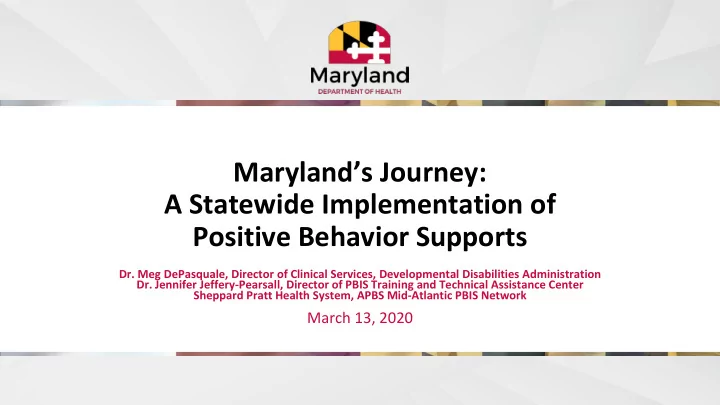

Maryland’s Journey: A Statewide Implementation of Positive Behavior Supports Dr. Meg DePasquale, Director of Clinical Services, Developmental Disabilities Administration Dr. Jennifer Jeffery-Pearsall, Director of PBIS Training and Technical Assistance Center Sheppard Pratt Health System, APBS Mid-Atlantic PBIS Network March 13, 2020
Maryland’s Journey: Statewide Implementation The Developmental Disabilities Administration (DDA) has four regional across the state 2
Maryland’s Journey: Statewide Implementation • In 2018, organization-wide Positive Behavior Supports (PBS) was first introduced in Maryland through a pilot • Eight provider agencies volunteered to be a part of the pilot • Communication with the eight agencies occurred to confirm that the interest was still there and to set up next steps • Seven agencies agreed to be part of the pilot 3
Maryland Partnership and Cascade of Support State Implementation Team Coaching, Training & Regional Evaluation Teams/Support Organizational Coaching, Training & Implementation Evaluation Team Site Coaching, Training & Implementation Evaluation Team 4
Participating Agencies ● Scale and purpose (size and focus) ○ Large system (e.g., Arc) ○ Smaller ○ Community based ○ Combination (community/residential) ● Demographics ○ Urban, populated areas – resource rich ○ Rural, few resources ● Attrition ○ 8…to 7….to 6….to 5 5
Maryland’s Journey: Statewide Implementation ● ICI and PBIS Mid-Atlantic met with the state DDA team January 2019 ● Readiness webinars were conducted with the seven agencies ○ Capacity and sustainability in mind: coaching, training & February 2019 evaluation ● Broken into 2 smaller groups for better communication ● Follow up webinars done to review progress on readiness March 2019 tasks ○ Positive and negative responses 6
Maryland’s Journey: Statewide Implementation • Two-day team training April 2019 • Webinar; virtual support to teams during installation of PBIS with their May 2019 organizations • Half-day state DDA leadership team meeting • Webinar; virtual support to teams during June 2019 installation of PBIS with their organizations 7
Snapshot of Tier 1 PBS Two-Day Training Overview of PBS and Key Features Emphasis Teaming Voice (individual and staff/faculty) Resource mapping, organizational Training and supporting (e.g., workforce coaching) staff/faculty Core Values/Expectations Staff buy-in Teaching Feedback/acknowledgement Responding to problem behaviors 8
Snapshot of Tier 1 PBS Two-Day Training Example: Team Initiated Problem Solving (TIPS) 9
Maryland’s Journey: Statewide Implementation • Site visits and learning walks for baseline April 2019 fidelity data collection and feedback on July - Nov 2019 installation plans • Strengths and challenges June 2019 • Half-day DDA leadership meeting • Day 3 of training for teams with the focus on June 2019 data collection and valued outcomes 10
Learning Walks • On site • Leadership team • Tiered Fidelity Inventory (IDD) • Core features • Visit pilot sites • Baseline • Technical assistance • Range of depth 11
Learning Walks – Lasting Change Takes Time 12
The ARC of the Northern Chesapeake ● Services: ○ Employment Services ○ Family Support Services ○ Treatment Foster Care ○ Community Living ○ Personal Supports ○ Community Partners ● Visited group home and vocational learning site 13
The ARC of the Northern Chesapeake ● Started with biweekly team meetings ● Various formats for meeting ○ PBS team – 1 person from each department ○ Leadership team – every person from each department ○ Town Hall – done on a quarterly basis for everyone ○ Annual Meeting – done yearly basis for everyone ● Identification of roles when in the meetings to share responsibilities ● Department Spotlight, You Matter Spotlight, Positive Behavior Support Happy Hour 14
PBS Home Site For Staff 15
PBS Agency-Wide Matrix 16
Department Spotlight 17
Vocational Site 18
SEEC • Provides community supports for over 300 people to fully engage in their communities • All of the work they do is within the community • Met with leadership team • At the time of learning walk had not yet implemented in 2 homes where they were work 1-3 persons 19
SEEC Took the concept of PBS and made the decision to make a cultural change within their agency • How would they communicate in a deliberately positive manner as an agency? • Lots of buy in from the beginning • Representation from all departments • Team meets with the executive leaders once a month to report on progress • Building an identity that gives a purpose and mission statement 20
SEEC ● This commitment became the springboard for their PBS team to develop a purpose statement ● PURPOSE STATEMENT ○ The Positive Communications Group is shifting a change within SEEC agency-wide to develop an environment that embodies a positive culture modeled through our communication, planning, and behavior with colleagues and the people we support 21
Small and Rural Agencies ● Slower start ○ Administrative/clinical/mid-management – difference in staffing capacity ○ Staffing – barrier to active involvement within leadership team ● Range of implementation ○ Teaming ○ Pilot sites ● Appreciated the personal contact 22
Where Is the DDA Going? For the next 2 years: ○ Training and mentoring for Regional teams ○ Continue to train and support Cohort 1 ■ Expanding into more sites within organization ■ Expanding into secondary prevention ○ Begin Cohort 2 implementation process ■ Readiness webinars ■ Two-day in-person training ■ Learning walks at pilot sites ■ three-day in-person training 23
Lessons Learned ● Plan for attrition ● Build state-level, regional team ● Importance of starting with capacity and sustainability in mind ○ Key elements (i.e., running team meetings) will generalize ● Necessity of on-site visits ● Data scares people - tred lightly ● Working smarter, not harder 24
Acknowledgement The organizations below contributed to this training 25
Recommend
More recommend